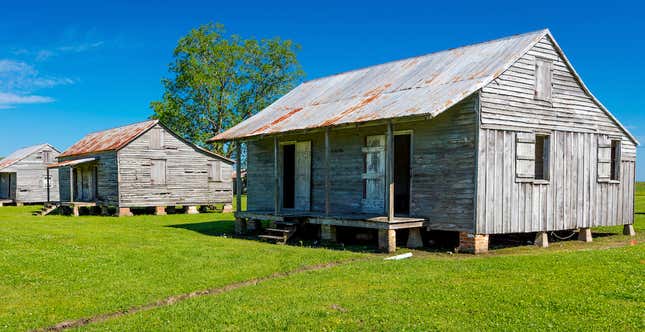
In a long overdue announcement, Airbnb says they will no longer allow people to list properties that were previously used to house enslaved people, per Buzzfeed News. Over the summer, a TikTok exposing a slave cabin listing in Mississippi went viral. Now every slavery-related listing will be swept from the rental site.
The new policy states any listing of a residence on a plantation “if structures that existed during the time of slavery are still present on the property” will be taken down, per the report. Additionally, any structures built for the purpose of housing enslaved people will be barred from future listings, and renters will be prohibited from using a property’s “slave-related features” as a marketing tool. That means no more “cozy cabin with charming history” listings. Ben Breit, an Airbnb spokesperson, told BuzzFeed they are actively being taken down.
The site-wide ban follows the company’s new anti-discrimination initiative called Project Lighthouse.
“Discrimination and bias unfortunately happen in our world, so they can play out on platforms like Airbnb - and that’s unacceptable to us. We want everyone to feel safe and welcome using our platform. We believe you can’t fix what you don’t measure, so we’re using Project Lighthouse to help us uncover disparities among perceived racial groups and inform our work to make Airbnb more equitable for people of color,” said Janaye Ingram, Airbnb Director of Community Partner Programs and Engagement.
Read more about the policy from Buzzfeed News:
Evan Feeney, a deputy senior campaign director for Color of Change, said Airbnb’s new policy was an “industry-leading prohibition on the glorification and marketing of slavery” that they hope other vacation rental platforms will emulate. Color of Change first reached out to Airbnb in 2019 about plantations where people were enslaved being rented out on its website, according to Feeney.
The company came under fire in July this year over a “slave cabin” listing on its platform after a TikTok about the rental went viral.
Called the Panther Burn Cottage on Belmont Plantation in Greenville, Mississippi, the listing described it as “an 1830s slave cabin” that “has also been used as a tenant sharecroppers cabin,” and boasted the building’s “wide cypress boards [that] are original to the first build in the 1830s.”
Airbnb began exploring a policy on slavery-related properties and experiences following [the] TikTok, Breit said.
Though this initiative is a step in the right direction, Airbnb had the opportunity to address this slave cabin issue when it was brought to them three years ago. What was the hold up? Before this announcement, there weren’t any restrictions on Airbnb hosts that would omit slave cabins from being rented. On the other hand, it’s not like the plantation property owners care about who’s renting the quarters anyway since they often repurpose the mansions and fields as wedding venues.
That is why organizations like the Slave Dwelling Project have been fighting to make sure these structures are remembered for their historical significance and not whitewashed like the rest of 1800s American history.

